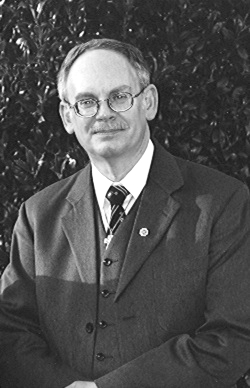

| Calendars Click Selection |
John Craton's Home Page biography section reveals Craton's interest in becoming a musician from an early age and points out his studies with JSU music faculty and his experience playing in the JSU String Orchestra.
Composer of Opera Premiering in June
Studied under JSU Faculty
John Craton
The premier performance of Anniston native and composer John “Doug” Craton’s Inanna: An Opera of Ancient Sumer is set for June 3 in Modesto, California. The Townsend Opera will perform the production at their first annual fundraiser concert called “Classics by the Creek.” The concert will also be performed on June 30 for the Assyrian Aid Society of America Central Valley Chapter in Modesto. That event is entitled “Mesopotamian Night Under the Stars.”
Craton graduated during the 1970s from Saks High School and later attended Jacksonville State University. He now lives in Bedford, Indiana. He is the son of Sue Craton of Anniston and the late Buck Craton. He is married to Dr. Deborah Craton, and the couple plans to attend the premier.
The opera is based on the ancient Sumerian Inanna poems, many of which are believed to have been written by High Priestess Enheduanna circa 3000 B.C. The opera weaves three principal episodes from the narrative tale. Proceeds from the event will benefit humanitarian projects in Northern Iraq.
The Wolfhead Music Publishing Company lists John Craton among the composers whose works are currently in print by their company. Their listing cites Craton as follows:Contemporary American composer, Craton studied music theory and composition under John Maltese, Gerald Moore, and Henry Fusner. His compositions typically reflect the English pastoral school “with an American twist,” and his works have been compared to those of Ralph Vaughan Williams and Gustav Holst. Craton’s music frequently evokes a curious blend of medieval harmonies with pastoral lyricism and has been performed by such artists and ensembles as Sebastiaan de Grebber, Lester Turner, John Tabler, Ferdinand Binnendijk, Eva van den Dool, Het CONSORT, Het Orkest van het Oosten, and the Amsterdam Symphony Orchestra.
A listing of recent and upcoming performances of John Craton's works reveals the extent of his success as an American composer.Born in 1953 in Anniston, Alabama, John Craton hails from an extended family of musicians, including both professionals and amateurs. His own career began on the violin at the age of ten, and he began studying piano at fourteen. He made his first feeble attempts at composing at age eleven. Craton demonstrated rapid advancement on both violin and piano and was playing in the Jacksonville State University String Orchestra while still in high school. He studied violin under the late concert violinist Robert Louis Barron and John Maltese; piano under Louis Culver and Ouida Susie Francis; and music theory and composition under Gerald Moore and Henry Fusner. He began accepting private students in 1971 and has taught both violin and piano in Alabama, Tennessee, and Indiana. He received his B.A. from Lipscomb University in Nashville, Tennessee, and his M.A. from Indiana University, Bloomington.
Craton has played violin in the Jacksonville State University String Orchestra and String Trio, and piano with the JSU Woodwind Quintet. He also played violin, rebec, viola da gamba, and recorder with the Lipscomb University Early Music Consort and maintains an active interest in early music to this day. In 1973 he appeared in the Henry Fusner production of The Play of Daniel on rebec (a medieval ancestor of the violin). He briefly played second violin in the now-defunct Helen Fowler String Quartet of Indianapolis. Craton has appeared in numerous other recitals in Alabama, Tennessee, and Indiana, both as soloist and as accompanist. Due to a hand injury in 2002, he was forced to abandon any hope of further public performance. Since that time he has dedicated himself to teaching and composing. He currently resides in Indiana with his wife and three sons.
Craton’s music has been performed by such artists and ensembles as Sebastiaan de Grebber, Lester Turner, John Tabler, Ferdinand Binnendijk, Het CONSORT, Het Orkest van het Oosten, and the Amsterdam Symphony Orchestra. His works include a number of compositions for chamber ensembles ranging from violin to marimba and piano; five operas (Inanna: An Opera of Ancient Sumer, based on ancient Sumerian texts; The Curious Affair of the Count of Monte Blotto, a comic chamber opera; Vasya Whitefeet, a children’s opera; The Reconciliation, a reconstruction of the early American ballad opera with libretto by Peter Markoe; and The Fashionable Lady, also a reconstruction of a 1730 ballad opera with libretto by James Ralph); orchestral works such as Pagan Festivals for string orchestra, Beowulf (two versions, one a suite for ancient instruments and the other an orchestral suite), three mandolin concertos and a double concerto for two mandolins and orchestra, a concerto for tuba and orchestra, and a setting of Mongolian folk songs for viola and orchestra; and vocal compositions including The Love Song of J. Alfred Prufrock for tenor and strings and several song cycles. A number of his works are currently available in print from Wolfhead Music.
Although Craton at one time became a clinical audiologist in his professional life, he has maintained a strong interest in music, composition, and music instruction from his earliest days. After his local audiology practice was purchased by an Indianapolis concern several years ago, he decided to return to his roots and resume composing and teaching.
When not involved in music, Craton enjoys watching the Mets play baseball in the summer, the Saints football in the fall, and sumo wrestling whenever it is available in the U.S. He is an avid reader and has a special interest in history, particularly ancient history and the history of the First World War era.
Mr. Craton is a member of ASCAP, the American String Teachers Association, the Indiana Music Teachers Association, Opera America, the Classical Mandolin Society of America, the Monarchist League, and the Sons of Confederate Veterans.
